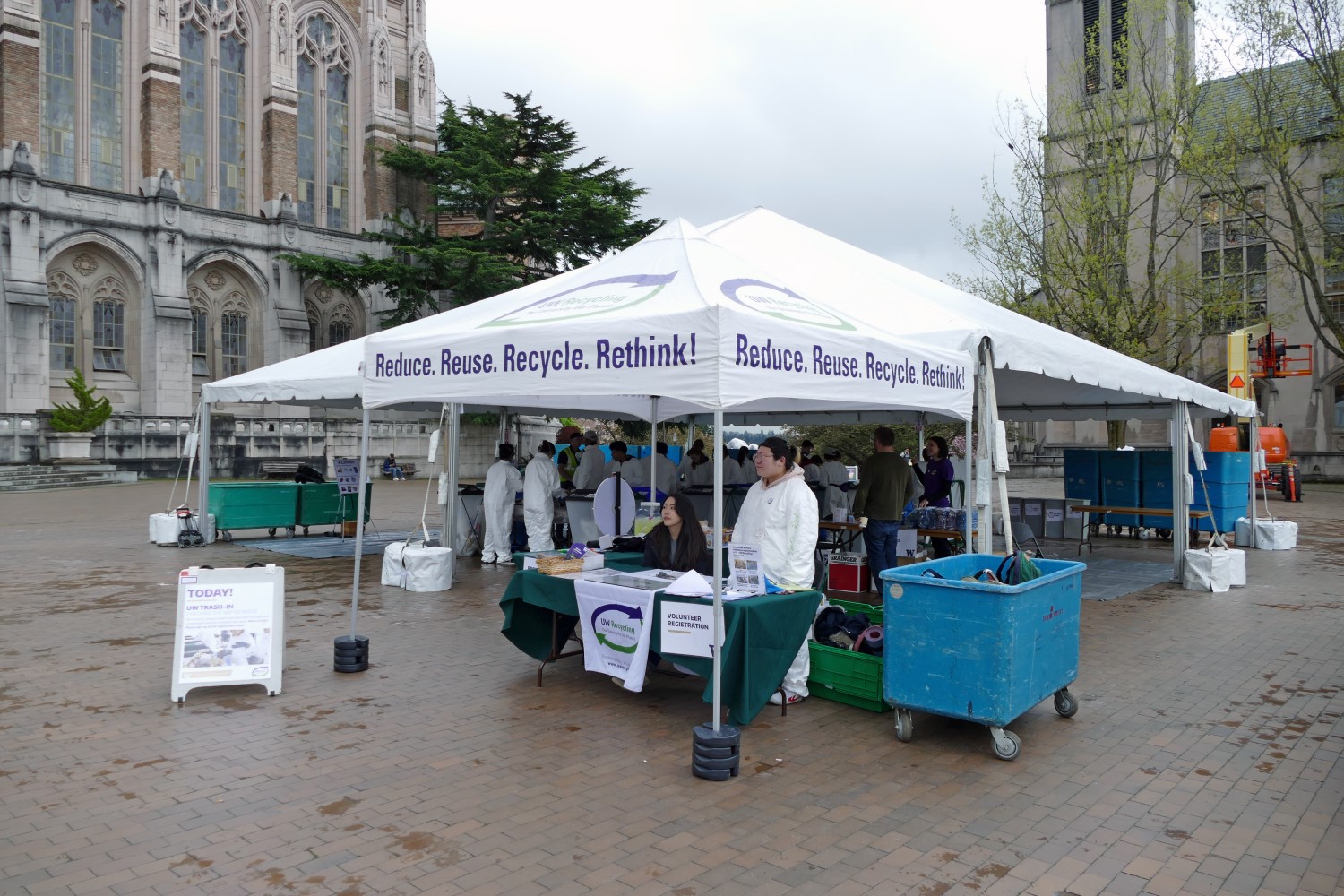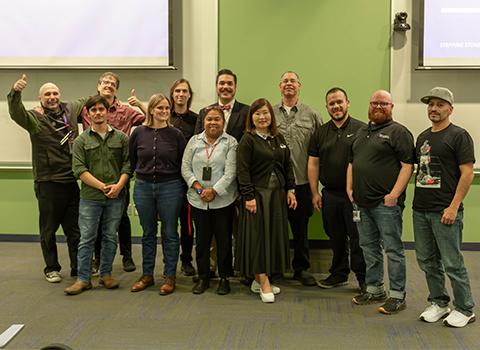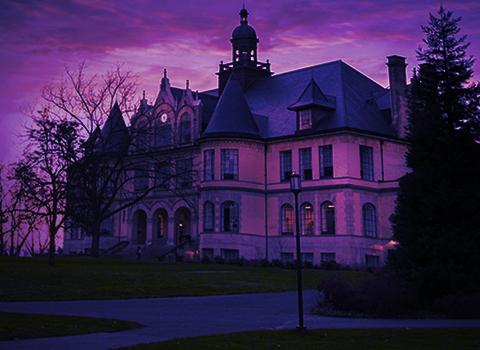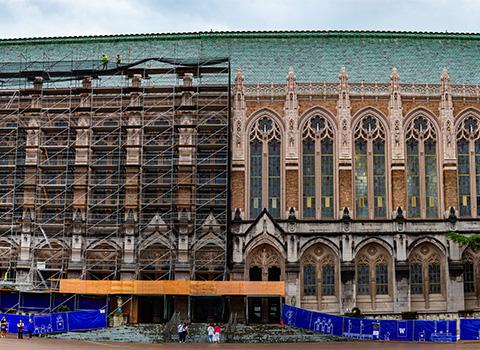UW Trash-In returns

For the first time in six years, UW Recycling held a Trash-In to determine how much compostable and recyclable material is thrown out instead of diverted from the landfill at University of Washington.
Dressed in Tyvek suits and protective gloves provided by UW Recycling, over 80 volunteers worked in shifts at sorting stations set up under a massive tent on Red Square on Friday, April 19, 2019 (including individuals representing UW faculty, staff and students, Cedar Grove, Harborview and Seattle Public Utilities). “It’s an amazing opportunity to join all members of our community to learn more about recycling and compost together,” said UW Recycling Manager Liz Gignilliat. The event was held during UW Earth Week, which leads up to the UW Earth Day celebrations.

Left: UW Recycling Program Support Supervisor Erica Bartlett instructs volunteers on safety gear.
Right: UW Recycling Manager Liz Gignilliat (left) and UW Recycling Program Coordinator Adam Fehn.
The last Trash-In held on campus took place in 2013. Organizing an event such as this is a major investment in time, so the team (led by UW Recycling Program Manager Adam Fehn) started planning in February 2019. “While there were many things that we had to plan for with this event, first and foremost was the safety of our volunteers,” said Fehn. “We had to make sure that we ordered all of the necessary personal protective equipment and initiated best practices to keep everyone participating in the event safe, happy and healthy.”
UW Building Services Department Director Gene Woodard supported the team as a volunteer sorter. “I appreciated my fellow volunteers' strong concern for the environment and how enthused they were to learn what the UW community can do to reduce what is sent to the landfill,” said Woodard. “A lot of people think that when material is thrown into a garbage bin, it will be sorted and saved later, rather than hauled 300 miles to be stored in a landfill forever,” said Gignilliat.
Waste not, want not
Waste not, want not
The sort was also a way for Woodard to take note of supplies his department is responsible for providing on campus. “To my dismay, I came across partially spent toilet paper rolls in the trash,” said Woodard. “I learned that I need to focus on correcting the wasteful practice of throwing away partially used toilet paper rolls for fear they won’t last to the next scheduled service — most toilet paper dispensers hold two to four rolls, so if one runs empty, one roll remains,” noted Woodard.
“Throughout the event, I was able to personally reflect on the consequences of the waste I quickly produce without much thought,” said UW Recycling Student Assistant Nawon Kim.

UW Recycling Student Assistant Nawon Kim (seated) awaits the arrival of scheduled volunteers.
Results of sorting 712 lbs. of waste
Results of sorting 712 lbs. of waste
- 336 lbs. of compost
- 65 lbs. or dirty recycling (sent to the landfill)
- 76 lbs. of clean recycling
- 202 lbs. of garbage
- 33 lbs. of liquids
Sorting through data
Sorting through data
UW Recycling observed that 47% of the waste thrown away overall was compostable, including:
- serviceware
- coffee cups
- straws
- clamshell packaging
Only 28% of the waste sorted during the event was actually garbage. Almost half (46%) of the recyclables collected were not able to be recycled because they were too dirty. The data from this year’s Trash-In corroborates with findings from the 2018 Waste Characterization Study. “Both sets of data indicate that a large amount of reclaimable material is being thrown in the landfill especially compostable material,” said Fehn. “They signify that we as a campus have a lot more work to do when it comes to composting our waste correctly.”
Empty, clean and dry
Empty, clean and dry
Liquids in waste and recycling cause contamination for other recyclable items. Because it’s so important for recycling to be empty, clean and dry in order to be successfully recycled, volunteers dumped any liquids they came across into a liquid collection bucket. Roughly four gallons of liquid from a variety of beverage containers were collected (that would have otherwise contaminated the recyclables).
In addition to instilling more waste diversion awareness on campus, the findings will be applied to the internal waste infrastructure at UW. In other words, it will help the team determine what additional bins are needed and where on campus they should be installed. “Since nearly half of the material in the garbage was compostable, we plan to add compost bins and extra signage to provide better access to composting,” said Gignilliat.
“In a society where a lot of the waste we produce is forgotten right after they are tossed away and ‘wishcycled,’ a Trash-In is a rare and valuable experience for faculty, staff and students to come together to confront and explore the way we waste,” said Nawon. "My favorite part of the event was one of our volunteers asking ‘When can we do this again?!’ after sorting through garbage for an hour or two,” said Gignilliat. “We’re excited to return for the next UW Trash-In around Earth Day in 2020!”



